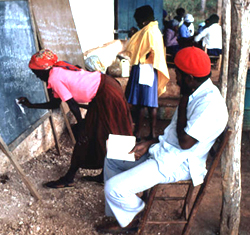Haiti

- © UNESCO/O.Pasquieres
- Literacy classes in a Haitian street
Haiti joined UNESCO on November 18, 1946. The UNESCO office in Port-au-Prince puts a special emphasis on education and communication projects.
UNESCO Director-General Koïchiro Matsuura’s first official visit to Haiti in February 2007 particularly underlined cooperation in education, culture and communication. He visited the Musée du Panthéon National Haïtien (MUPANAH), national museum which has an ongoing UNESCO-backed partnership with Cuba’s National Center for Conservation, Restoration and Museology (CENCREM) to safeguard Haitian cultural property.
Haiti is one of the first-round countries in the Literacy Initiative for Empowerment (LIFE). The 2007 launch of LIFE in Haiti began a national Three-year Literacy Campaign supported by a brigade of 22 Cuban advisers to reach 3 million illiterate in three years.
In the context of UNESCO’s Memory of the World programme, Haiti has been a key participant in the Slave Route Project launched in 1994 and subsequent projects such as the Slave Trade Archives. It is now involved in a programme of site inventory, aimed at developing cultural tourism.
The Ministry of Education, UNAIDS and UNESCO in Haiti produced a prevention guide for HIV and AIDS for young people in January 2006.
With UNESCO’s International Programme for the Development of Communication (IPDC) a multimedia centre has been created in Port-au-Prince.

